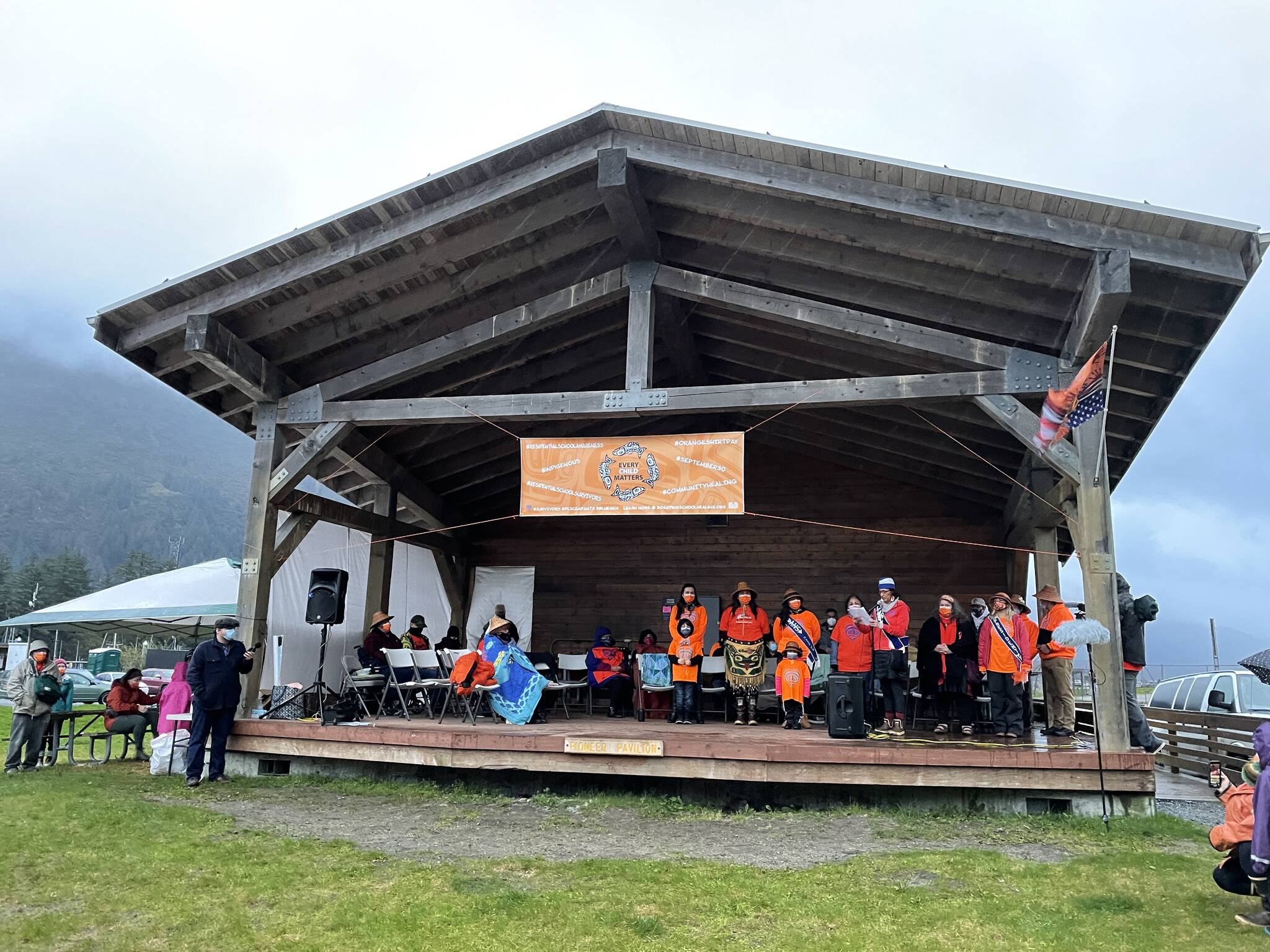More than a hundred gathered at Savikko Park, in the former grounds of the Alaska Native village that stood there before being razed by the city council of the time, to remember the victims of the residential school system on Thursday night.
Torrential rain and biting wind did not dampen the ardor of the speakers or the spirits of the crowd for the Orange Shirt Day event, a remembrance of the Indigenous children who never returned from the residential schools across the U.S. and Canada.
“The event last night was beautiful,” said Jamiann Hasselquist, vice president of Alaska Native Sisterhood Camp 2 and organizer of the event and the education night that preceded it. “It’s appropriate that the weather was coming down that way when we’re talking about such hard things.”
[Revenue Department announces 2021 PFD amount]
The boarding schools were a government-backed and largely church-operated system designed to rend Alaska Natives and Native American children apart from their cultures, languages and histories.
Recent discoveries of mass graves of hundreds of children near residential schools in Canada have thrust the issue into the forefront as Indigenous cultures reckon with the appalling legacy of the schools, leading to the popularization of Orange Shirt Day, celebrated on Sept. 30.
“It was so special. I have never in all my days felt love for my community,” Hasselquist said. “But yesterday was a day where I felt so much love from the community and healing for my own heart and own mind. But it wasn’t just mine. There was at least 150 people there.”
Speakers included the descendants of survivors of the school. The schools were infamous for the mental, physical and sexual abuse that was rampant throughout the system, particularly in the church-run institutes, and for the deaths of some of the children forced to attend.
“My mother, Rosa MIller, went to an institute in Wrangell,” said Fran Houston, one of the speakers. “She said her main problem was that she couldn’t speak her Tlingit language and when she did they punished her.”
Another speaker recalled the firing of the Douglas Indian Village, whose land Savikko Park now stands on.
“While we were on the river fishing, and they knew where we were at, [the Douglas city council] found a loophole,” said John Morris. “I was present when they burned my house. The fire trucks came, they broke all the windows, and started the fire.”
Hasselquist displayed an article from the Alaska Daily Empire, the old name for the Juneau Empire, describing the fire, describing the 1962 event as “a nice night for a fire” and talking about children who, disappointed that the flames were too hot to roast hot dogs on, were encouraged to fling stones at the windows instead. While the passage of time smooths some edges, Morris said, the memory is perfectly clear.
“These things are burned into my memory forever. I have lived with the bitterness for many, many years,” Morris said. “I forgave but I cannot forget. I still wish to see these injustices corrected.”
Hasselquist said that the subjects being discussed were painful but necessary.
“There’s a lot of hard conversation going on today. We’re breaking the silence to facilitate healing,” Hasselquist said. “If we don’t heal we were bound to pass it on. We must break the silence name the true source of the pain.”
This year’s event was the first major Orange Shirt Day event in Juneau, but it won’t be the last, Hasselquist said.
“The whole event in itself was very impactful. We had a great turnout- Indigenous and non-Indigenous people. We’re just in awe of the outpour and the awareness we created, the conversations and the healing actions to follow,” Hasselquist said. “We’re definitely going to keep doing this. It’s just, how is this going to look next year with this act? I suspect they’ll start doing investigations and recovery of our young ones.”
• Contact reporter Michael S. Lockett at (757) 621-1197 or mlockett@juneauempire.com.

